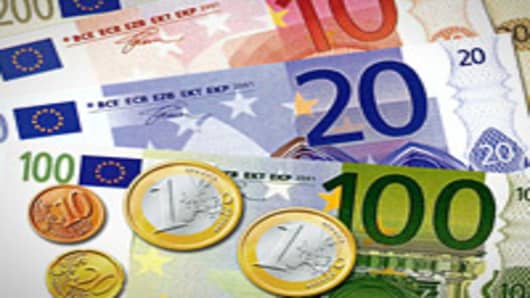The arm-in-arm effort by central bankers to increase U.S. dollar liquidity in Europe is essentially a band-aid solution, and the euro is already backing off its gains.
"They're taking care of the symptoms, but the underlying illness is still out there. On the margin, it's positive. Until Greece defaults and we clear this whole thing up, they're still treading water," said Win Thin, senior currency strategist at Brown Brothers Harriman.
Just ahead of the Wall Street open Thursday, the European Central Banj, along with the U.S. Federal Reserve, Bank of England, Bank of Japan and Swiss National Bank announced they would offer three-month dollar loans to Europe's commercial banks, easing dollar funding constraints.
European banks need the greenback to fund loans to U.S. customers and also to repay their own dollar borrowings. But the funding was becoming more difficultto come by as usual U.S. sources, such as money-market funds, provided less dollars as the sovereign debt crisis flared up.
The ECB said it would hold three fixed-rate operations between October and December. The ECB offers seven-day dollar loans each week, and it was tapped by banks this month for the first time since February.
Thursday's announcement sparked a move higher for risk assets, with European bank stocks and equity markets leading the way higher. The euro touched a high of 1.393, before backing down to 1.386 in morning trading. The German and French stock markets finished the session more than 3 percent higher, and U.S. stocks climbed more than 1 percent at midday, despite a poor showing on U.S. economic data Thursday.
Analysts said, for now, the euro will probably remain in its current 1.35 to 1.40 range. The euro moved to this lower range after the ECB turned away from its interest-rate hiking policy last week.
"This is not a game changer. This is a tourniquet on an open wound. It's a backstop measure for banks," said Foreign Exchange Analeptics analyst David Gilmore on CNBC's "Squawk on the Street." "It restores some of the confidence in the banking system in Europe, but the bigger issue of solvency in periphery government debt balances—Greece, Portugal, Ireland, Spain, Italy—those are still on the table and they have not been resolved."
The announcement also comes ahead of a Friday meeting between Treasury Secretary Timothy Geithner and European finance ministers, who are meeting in Poland for the Eco Fin conference. There was speculation that Geithner would be pushing European officials to find other ways to use the European Financial Stability Facility (EFSF) to help support its banking system.
"What can he do? You can't help a group of leaders that can't help themselves," Gilmore said in a telephone interview. He added that euro zone countries could help themselves by setting up some type of centralized fiscal authority that would take on the role of rescuing countries and helping banks.
Gilmore said the EFSF will be used to purchase sovereign debtand also provide a way for euro zone governments to provide funding to banks. Its original purpose was to provide funding for debtor countries in need of funds. The enhanced powers of that fund must be approved by all 17 countries in the euro zone. The fund is also smaller than analysts believe is needed, holding just 400 billion euros ($554 billion).
Boris Schlossberg of GFT Forex said the very announcement by the central banks adds some transparency to what had been a murky situation surrounding Europe's banks.
"It's going to be difficult for the euro to climb above 1.40. It all comes down to credit risk. Until they can create some sort of structural solution for this, I think the market is going to take everything with a grain of salt," said Schlossberg.
Markets respond favorably to talk of a pan European bond, and the euro rose after European Commission president Jose Manuel Barroso said Wednesday the commission would present options for a European bond.
German Chancellor Angela Merkel, however, reiterated her opposition to such a bond. "The problem is Merkel cannot sell it to the Germans right now. The Germans are feeling like they're forced to float all these debtor neighbors," said Schlossberg.
Questions? Comments? Email us at marketinsider@cnbc.com



